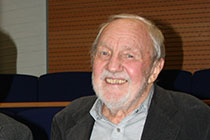Profile
David M. Smith (1936-2021) was appointed to a Chair in Geography at Queen Mary College in 1973 following earlier positions in the USA, Australia and South Africa. He spent a very productive 28 years at Queen Mary, including a spell as Head of Department from 1981 to 1985. David retired in 2001 and became Emeritus Professor and ever since the School has celebrated David’s contributions to the university and discipline via our Annual David M. Smith Lecture.
David’s academic career spanned remarkable intellectual breadth. He started out researching industrial archaeology in the 1960s, moving quickly in the context of Geography’s quantitative turn to writing about location theory. His books on location theory were hugely influential in the discipline and even amongst a generation of A Level students who became familiar with his name as they were taught industrial location at school! Through the 1970s David’s focus shifted to developing a geographically-informed version of welfare economics (see, for example, Where the Grass is Greener, 1979) which spurred a deepening interest in questions of geographical inequality and injustice. His work was truly international and collaborative and in a steady stream of books and papers he explored these themes in varied contexts ranging from Apartheid South Africa, to Israel-Palestine and Eastern Europe and the former USSR. In the latter stages of his career, David pioneered work at the interface of geography and social justice and in his final substantive book, published in 2001, explored the relationship between Geography and moral philosophy.
Along with several other significant former colleagues, David’s work was crucial in shaping the intellectual agenda and identity of Queen Mary's School of Geography.
A biographical memoir of David's life and career was published by the British Academy in 2023 and it is accessible here. It was written by Professor Tom Slater (Columbia University and formerly a student of David’s at Queen Mary) and Professor Roger Lee (Emeritus Professor at Queen Mary).
